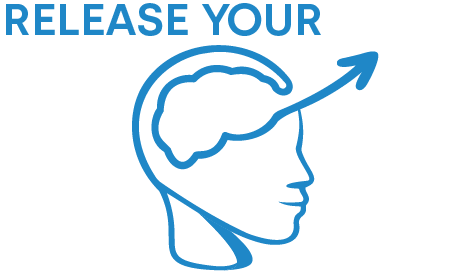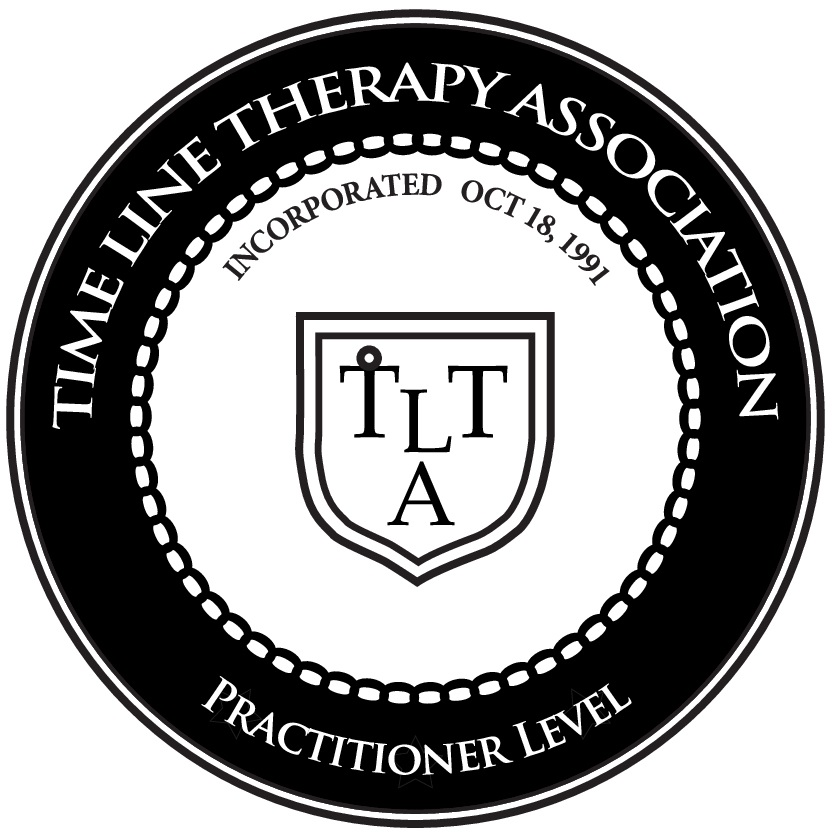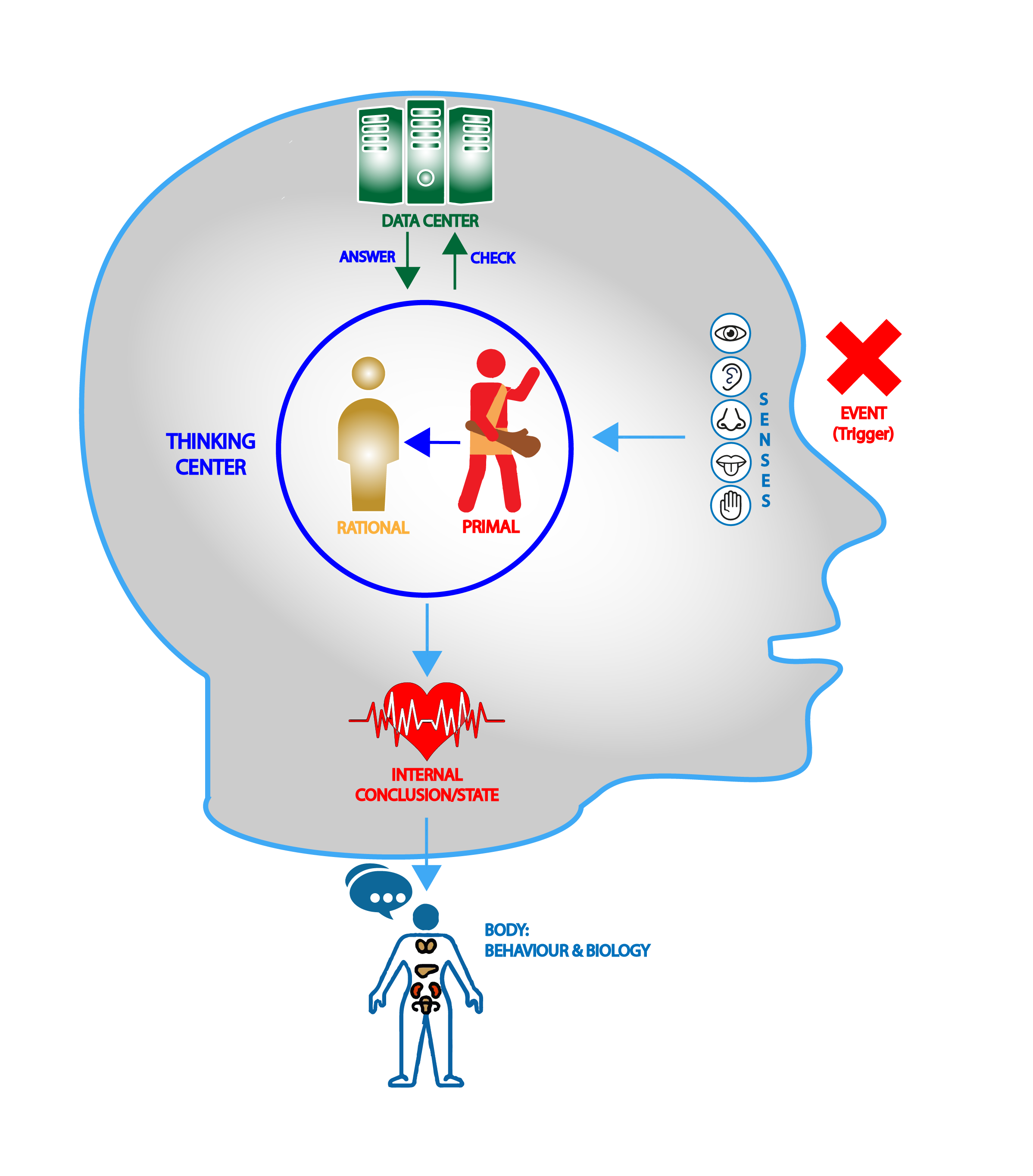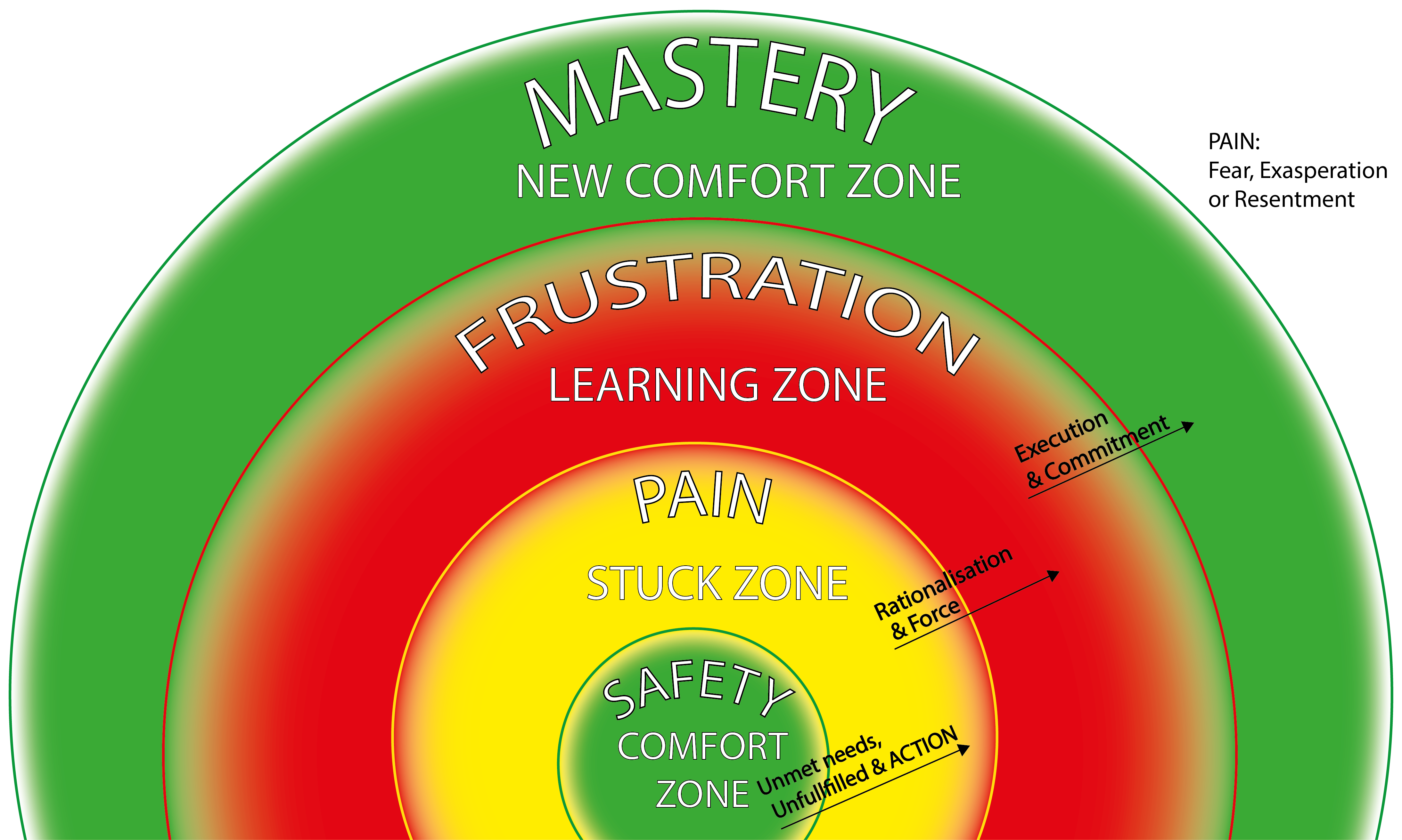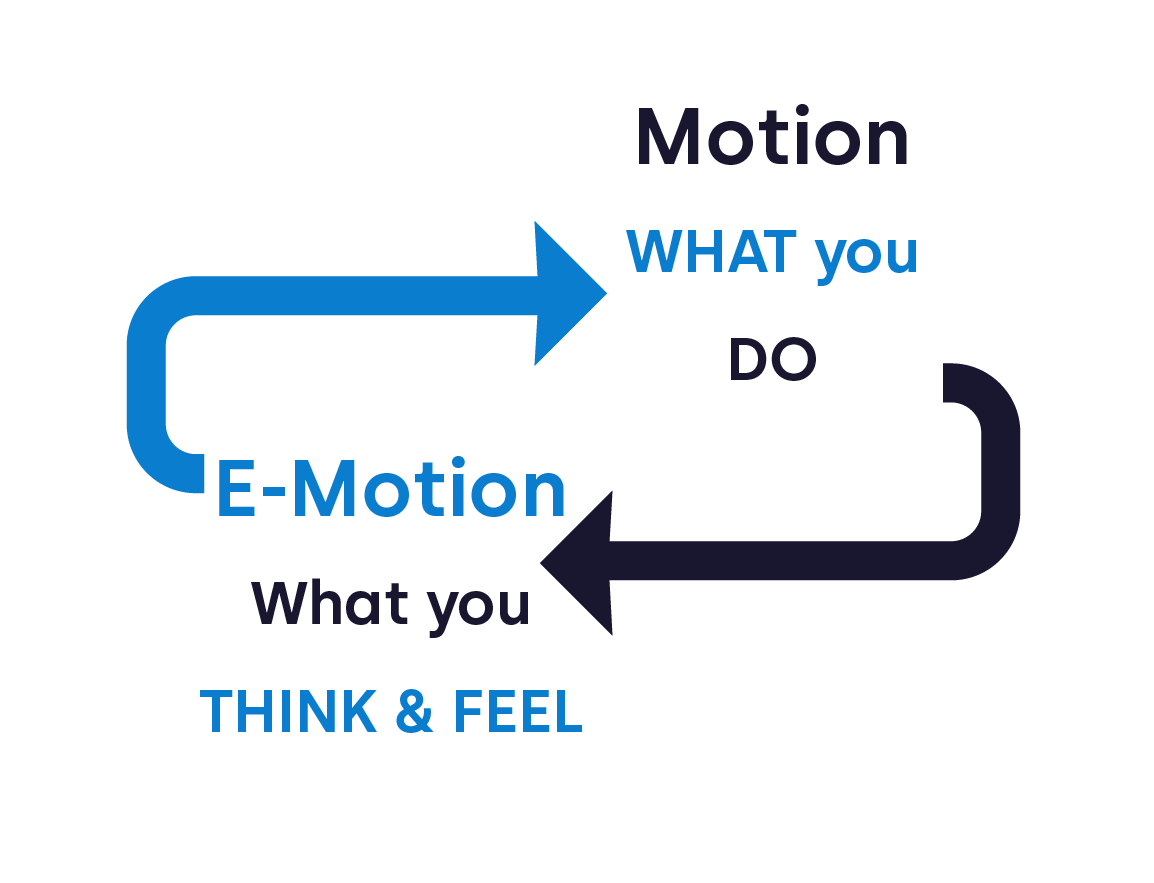Social principles – What will you get from this article?
Is this FOR you?
By the end of this article, you will have :
✅ Elevated your ability to initiate authentic, genuine and effortless interactions.
✅ Grasped the significance of rapport building for instant connections, influence, and networking.
✅ Took away the fundamental drive of meaningful connections and professional partnerships.
✅ Acquired an approach on how to navigate social dynamics with finesse and how to nurture lasting relationships.
Is this like YOU?
❓ Have you ever found yourself to:
– Struggle to establish a genuine connection when meeting new people or with colleagues?
– Experience challenges in building rapport & trust with clients or team members?
❓ Would you like to know the two fundamental laws of rapport building? By doing so, it can serve as a guiding principle in your interactions with others.
What will you learn?
You will gain insights into “conscious rapport building” & its “social principles”.
Specifically, you will learn about its:
– Definition
– Core principles
– Significant impact on your professional and personal realms.
Reminder – Why learn this?
With this knowledge, you would be in an improved position to:
✔ Strengthened and refined your interpersonal & communication skills
✔ Gear yourself toward the impact & results that you want
✔ Increase your well-being & self-confidence
✔ Manage any unwanted thoughts or behaviour stemming from your PRIMAL mind (Emotional brain)
E-motion brings motion !
Recap previous article – Your PRIMAL mind & its connection with the social dynamic principles
This article mentions your PRIMAL (Emotional) mind.
It represents your limbic system, which is the hub of your emotions. To ease your understanding, we refer to it as your PRIMAL MIND.

it is a MAJOR part of your brain architecture as it interconnects with various other brain components, including:
– The frontal lobe, responsible for reasoning, which we call your RATIONAL MIND.
– The temporal lobe, handling memory functions, which we term your DATABASE.
This is explained in detail in this article, you can read it to understand what you are made of.
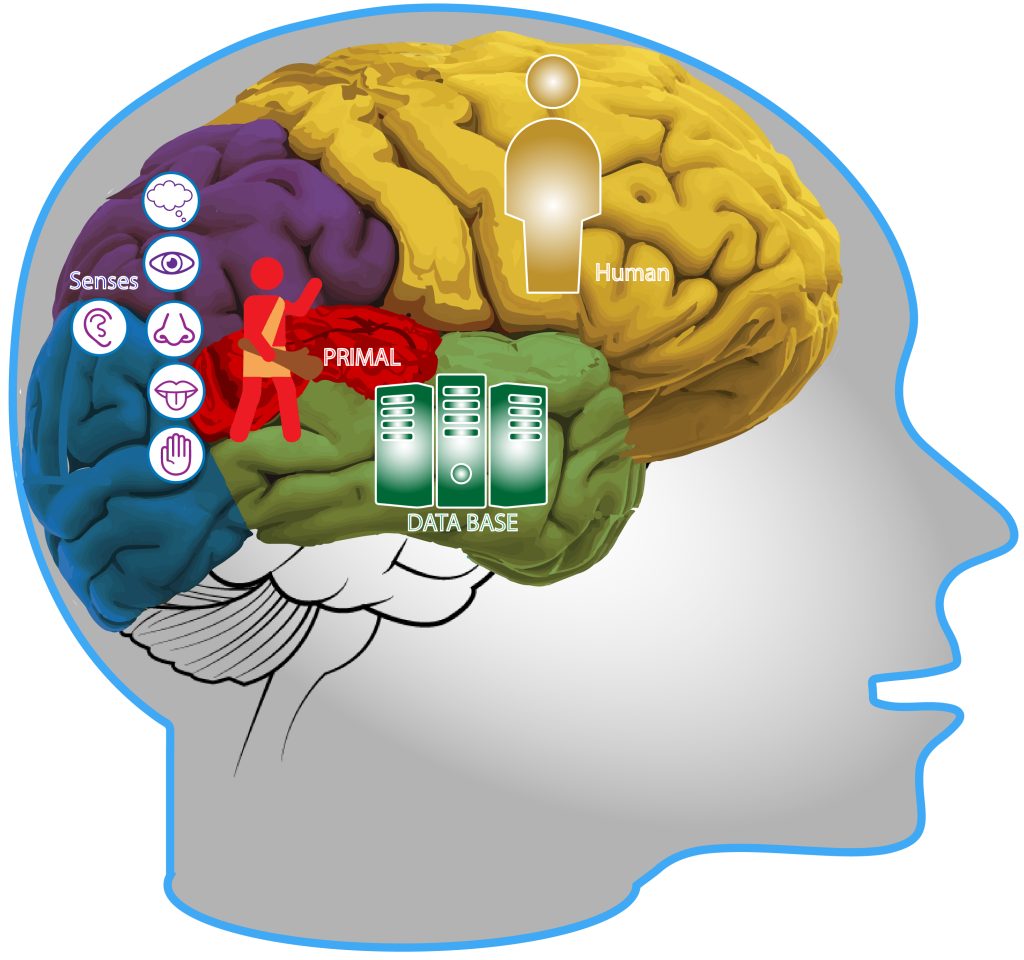
What is rapport?
Have you ever been with a friend, a partner, or maybe someone you just met and felt like they “get you”?
Some of us can describe it as that “warm feeling” or “feeling of butterflies in the stomach”.
Others described it as just feeling familiar with people.
It is essential for smooth conversations, whether in personal or professional settings.

Being in rapport is about GENUINE:
– Feel & share understanding with you and others
– Establish trust
– Demonstrate empathy
– Be in an environment where individuals feel valued and heard
Building rapport consciously is about taking charge of your interactions.
This is much like conducting a symphony, it involves skillfully orchestrating verbal and non-verbal communication.
These compose a harmonious masterpiece of collaboration and cultivating relationships that thrive.
Building rapport consciously is about taking charge of your interactions

Why build rapport consciously?
There are many benefits & purposes of building rapport consciously.
It would positively impact your personal and professional life.
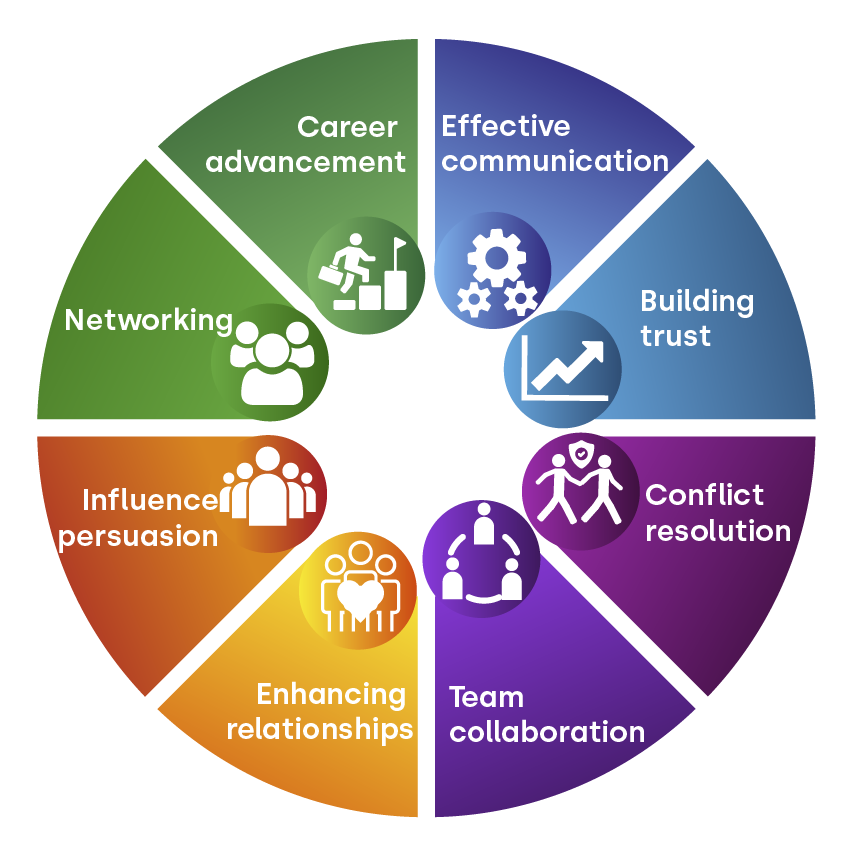
Impact on your personal & professional life
Effective communication:
Have you ever had a brainstorming session where everyone felt free to share ideas openly?
This is the effect of rapport in action, making communication a breeze.
– In professional life:
A team meeting where colleagues comfortably voice their opinions.
– In personal life:
Chatting with friends about weekend plans and having everyone contribute.
Building trust:
Trust is the outcome of being in rapport with others.
Once established, trust is the key ingredient for solid collaborations.
Think of a project where teammates trust each other’s expertise and judgment.
– In professional life:
Trusting your coworker to handle a critical task
– In personal life:
Trusting a friend to keep a secret.
Conflict resolution:
When disagreements arise, being in rapport and having a mutual understanding speeds up conflict resolution.
It’s like having a built-in mediator.
– In professional life:
Resolving a project disagreement through open communication.
– In personal life:
Settling a dispute with a friend by understanding each other’s perspectives.
Outcomes in your professional life
Team collaboration:
Teams with positive connections collaborate more effectively, leading to increased productivity and overall success.
– In professional life:
A successful project where team members complement each other’s strengths.
– In personal life:
Organising a community event with your friends.
Enhancing relationships:
This is the result of strong relationships built on genuine rapport.
Picture a workplace where everyone gets along like a tight-knit family.
– Example in professional life:
Developing a mentor-mentee bond that goes beyond work.
– Example in personal life:
Forming lifelong friendships from work connections.
Influence and persuasion:
Building rapport enhances your ability to influence, making people more receptive to your ideas.
Ever convinced your team to adopt a new approach?
– In professional life:
Pitching a new strategy that gains team approval.
– In personal life:
Getting your friends to try a new hobby together.
Career advancement:
It’s about connecting, networking effectively, and leaving a positive impression on your peers and clients.
In the professional world, landing a job often involves more than just qualifications.
– In professional life:
Networking at industry events to secure job opportunities.
– In personal life:
Landing freelance gigs through connections made at social events.
Networking:
Building rapport is the secret sauce in networking.
It opens doors, connects you with influential people, and brings exciting opportunities your way.
– In professional life:
Networking at conferences to expand career opportunities.
– In personal life:
Making friends at social gatherings who introduce you to new hobbies or interests.
Building rapport is a game-changer in both professional and personal realms.
It allows you to create positive connections, paving the way for success, and unleashing a positive vibe wherever you go.
The social principles of rapport building
Rapport is a natural process that happens unconsciously.
Yet when honing its innate principles you will appreciate the unconscious process that occurs with your interactions.
- Social principle # 1 – “A relationship is a process of relating”
- Social principle # 2 – “When people are like each other, they like each other”
Social principle # 1 – A relationship is a process of relating
When examining your relationships (friends, partner…) notice that you and others are relating to each other’s needs.
They somehow respond to your needs and you respond to theirs, which is why you are in a “relationship” with them.
Examples with friends:
Be interested in the same subject: sports, travelling and interacting with them about it:
– Supporting the same football team and watching games together
– Having the same fashion sense and going clothes shopping together
Examples with a romantic partner:
– Having mutual physical attraction
– Sharing the same sense of humour
– Having goals and aspirations that are aligned with each other
Mutually addressing each other’s needs creates a connection, as it satisfies something meaningful for both parties.
→ Simply put, you are involved with things that “benefit” or “fit you” and others do the same with you.
“A relationship is a process of relating”
Social principle # 1
Social principle # 2 – When people are like each other, they like each other
Rapport is also a process of responsiveness.
Examples :
– People adopt dogs that look like them
The article Do Dogs Look Like Their Owners? from Psychology Today suggested that Data confirms that owners and their dogs tend to look alike.
– People hang out with people of the same beliefs, faith or interest:
Football fans, gym buddies, same ethnic group, cultural background …
Occasionally, it might not explicitly lead to “liking” in its literal sense; rather, it could start as a casual interest, and grow into authentic affection over time, especially when principles 1 & 2 are in play.
⚠️ Note :
Rapport building encompasses various elements, including your approach, skills (active listening, interpreting body language…), mindset and beliefs about people, and the world you live in. It also includes your agenda, wants and needs during interactions with others. Detailed explanations of all these components are provided in the social intelligence course.
The social principles & your PRIMAL mind
Your PRIMAL mind is responsible for meeting your needs as outlined in this article.
→ This means that when consciously applying the “Social principle #1 – A relationship is a process of relating“, it elicits a positive response in others’ PRIMAL minds.
→ “When people are like each other, they like each other” is a social dynamic principle that specifically feeds your PRIMAL (Emotional) mind’s need & drive for “Familiarity“.
“Familiarity” needs can be met by relating to whatever you and others are expressing.
It can be built on:
– Culture, behaviour and centre of interest: hobbies, religion …
– Physical appearance: looking alike, similar fashion sense, body.
Note: This is often shown via non-verbal communication: gestures, voice, tone
– Languages: speaking the same way, accents, …
Note: This is often shown via verbal communication: Words

→ Other needs that can find fulfilment through a high level of rapport include:
– “Connection/tribe“
– “Ego/sense of importance“.
For you to capture the essence of rapport bonding, it is essential to be fully aware of our PRIMAL (Emotional) mind’s needs & drive. These are listed in this article on our website.
“When people are like each other, they like each other”
Social principle # 2
There are many components to rapport building yet these two principles are the main driving force behind report building.
Once you master how to apply it consciously, you can eventually manage your interaction to a high level of rapport.
Apply the social principles with verbal & non-verbal blueprints
Communication is divided into verbal and non-verbal signals.
Verbal communication uses spoken or written words for explicit expression.
Non-verbal communication involves gestures, facial expressions, and body movements to convey emotions and nuances.
Both components work together to create a comprehensive and effective means of human interaction.
For a straightforward and applicable implementation of the social principles, the following articles offer detailed frameworks for instantly establishing rapport in your personal or professional endeavours.
Communication is divided into verbal (words) and non-verbal (body language) signals.
Verbal tool (Words):
You can pick up the “F.A.N.C.Y words alchemy” for an instant report.
It focuses on the words and frames you can use to build rapport.
Non-verbal (body language) tool:
You can grab the “E.V.E.N.T.T.S charisma toolbox“, which turns you into a social magnet.
This article lists the body language signals (non-verbal actions) you can consciously use to build rapport.
The success and impact of these methods is grounded in their ability to meet the essential needs and drives of the PRIMAL (Emotional) mind, which include:
✔ “Familiarity”
✔ “Connection/tribe”
✔ “Ego/sense of importance”.
Enjoyed this article & curious to take it to the next level?
Realise that this article is an extract from the fundamentals of the Calm & Stress Management, Social Intelligence & Emotional Intelligence workshops.
These workshops are transformative blends of relaxation, mind management & communication tools & techniques.
Designed to release your best, these workshops will deliver you the methods to :
✔ Become more relaxed & reduce your stress
✔ Be in charge of your emotions & increase your well-being
✔ Develop your leadership & influence
→ For any questions about these workshops, you can schedule your FREE discovery call to find out more.
Up until next time, go learn & go RELEASE YOUR BEST !!!
